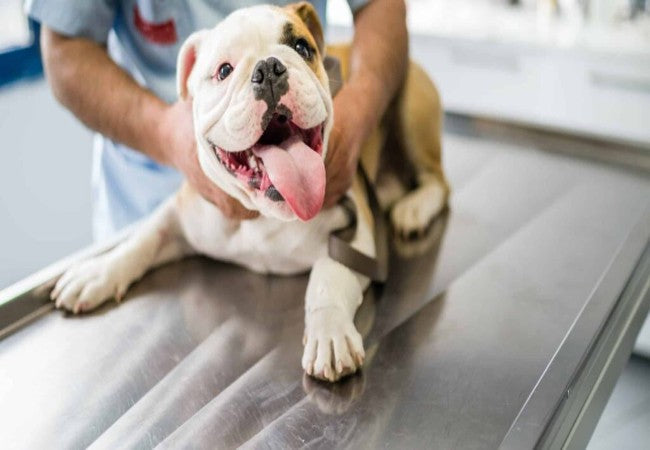Vet Approved Guide Dog Vet Checkup Schedule by Age 2025 🐶🩺

In this article
Vet Approved Guide Dog Vet Checkup Schedule by Age 2025 🐶🩺
By Dr. Duncan Houston BVSc
Routine veterinary care is one of the most important ways to keep your dog healthy and catch issues early. But how often should your pup see the vet? The answer depends on their age, breed, lifestyle, and health status. As a veterinarian, I often advise pet parents on creating a personalized care schedule—especially for new puppies and aging dogs. 🐾
This guide will help you determine the right veterinary schedule for your dog at every stage of life—with expert support from Ask A Vet. 🐶🩺
🐕 Puppy Vet Visit Schedule (Birth–12 Months)
Puppies need more frequent visits to monitor growth, administer vaccines, and establish good health habits. 🍼
🗓️ Suggested Timeline:
- 6–8 weeks: First physical exam + first vaccines (DHPP)
- 10–12 weeks: Vaccine boosters + deworming
- 14–16 weeks: Final vaccine boosters + rabies shot
- 6 months: Spay/neuter + behavior review
- 12 months: Annual exam + booster vaccines
🐾 Adult Dog Vet Visits (1–7 Years)
Once your dog reaches adulthood, they should still visit the vet at least once per year for a thorough exam, parasite screening, and booster shots. 📅
🩺 What’s Included in a Yearly Visit:
- 💉 Vaccine boosters (DHPP every 1–3 years, rabies every 1–3 years)
- 💩 Fecal exam for intestinal parasites
- 🦷 Dental health assessment
- ⚖️ Weight and nutrition evaluation
- 🧠 Behavior review (aggression, anxiety, mobility)
Dogs with chronic conditions (allergies, diabetes, arthritis) may need checkups every 6 months or more. 📋
👵 Senior Dog Vet Visits (7+ Years)
As dogs age, health issues become more common—especially heart disease, joint pain, dental disease, and organ decline. 👴
📅 Visit Frequency:
- Every 6 months: Physical exam and senior screening
Recommended Tests:
- 🧪 Bloodwork (CBC, chemistry panel)
- 💧 Urinalysis for kidney function
- 📈 Blood pressure screening
- 🦴 Joint and mobility evaluation
🧬 Special Considerations by Breed and Lifestyle
- 🐶 Brachycephalic breeds (Bulldogs, Pugs): Monitor respiratory issues more closely
- 🎯 Working or sport dogs: May require joint or performance evaluations 2x/year
- 🐾 Giant breeds: More prone to heart, joint, and cancer risks—screen earlier
💉 Vaccine Schedule Summary
Core Vaccines (All Dogs):
- 💉 DHPP (Distemper, Hepatitis, Parvovirus, Parainfluenza)
- 💉 Rabies
Non-Core (Based on Lifestyle):
- 💉 Leptospirosis (for outdoor or water-loving dogs)
- 💉 Bordetella (kennel cough—daycare, groomers, boarding)
- 💉 Lyme disease (in high-tick regions)
- 💉 Canine Influenza
Use Ask A Vet for vaccine scheduling, titer testing, and local disease recommendations. 📱
🧠 Behavior & Wellness Checkpoints
Vet visits are about more than vaccines—they’re a chance to track:
- ⚖️ Weight and diet
- 🦷 Oral health
- 🧠 Behavioral issues (aggression, fear, house soiling)
- 🦴 Joint health and mobility
📅 How Often Should You Call or Use Telehealth?
- 🩺 After vomiting or diarrhea lasting over 24 hours
- 🧠 Sudden behavior changes
- 💉 Vaccine reactions or missed doses
- 🦴 Lameness, swelling, or limping
Use Ask A Vet for immediate guidance between scheduled checkups. 📱
✅ Final Takeaways: Stay Consistent, Stay Ahead
Routine vet care saves lives. Whether it’s a pup needing vaccines or a senior dog with arthritis, regular checkups give your vet a chance to catch issues early and keep your dog thriving. 🐕❤️
Quick Recap:
- 🐶 Puppies: every 3–4 weeks until 16 weeks old
- 🐕 Adults: annually
- 👴 Seniors: every 6 months + bloodwork
- 📱 Use Ask A Vet between visits for advice
Need help planning your dog’s care? Visit AskAVet.com. 🩺🐾






